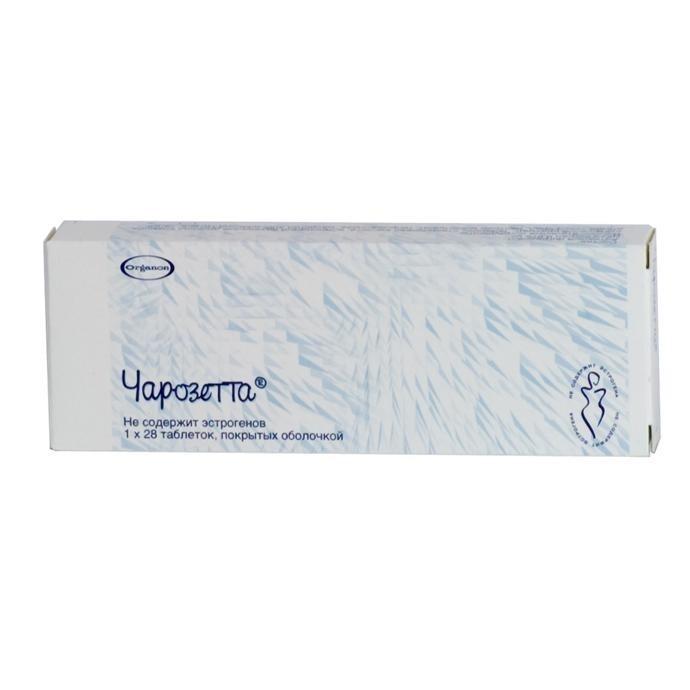Description
Latin name
CERAZETTE
Release form
Film-coated tablets.
Packing
In a blister pack of 28 tablets. There are 3 blisters in the package.
Indications
Contraception.
Contraindications
Hypersensitivity to the active substance or any excipient of the drug.
Established or suspected pregnancy.
Current or history of venous thromboembolism (including deep vein thrombosis of the leg, pulmonary embolism).
The presence at the moment or in the anamnesis of a severe liver disease (until the liver function indicators normalize).
Hepatic failure, including in the anamnesis.
Identified or suspected malignant hormone-dependent tumors.
Vaginal bleeding of unknown etiology.
Lactose intolerance, lactase deficiency, glucose-galactose malabsorption.
Caution
If you have any of the following conditions / risk factors, you should weigh the benefits of using gestagen and the possible risks for each individual woman. This should be discussed with the woman before she decides to start taking the drug. In the event of a worsening, exacerbation of the disease or the occurrence of any of these conditions, a woman should first consult a doctor. The doctor should decide on the appropriateness of further use of the Charozet drug):
Persistent hypertension that develops while taking the Charozet drug, or with ineffective antihypertensive therapy.
Thromboembolic disorders, including a history of: a woman should be warned about the possibility of relapse.
Prolonged immobilization associated with surgery or disease.
Since it is impossible to exclude the biological effect of gestagens on the development of liver cancer, an individual assessment of the benefit-risk ratio should be made when prescribing the drug to women with liver cancer.
Chloasma, especially in women with a history of chloasma during pregnancy: women with a predisposition to chloasma should avoid exposure to sunlight or ultraviolet radiation while using Charozet.
Use during pregnancy and lactation
During pregnancy, the use of the drug is contraindicated. Preclinical studies have shown that very high doses of gestagens can cause masculinization of the female fetus. Extensive epidemiological studies have revealed neither an increased risk of birth defects in children whose mothers took oral contraceptives before pregnancy, nor a teratogenic effect in case of unintentional use of oral contraceptives in early pregnancy.
The drug does not affect the quantity or quality (concentration of protein, lactose or fat) of breast milk. However, Small amounts of etonogestrel are excreted in breast milk. As a result, 0.01-0.05 micrograms of etonogestrel per kg of body weight per day can be delivered to the child (based on consumption of 150 ml / kg / day of breast milk).
There is limited evidence for long-term follow-up of children whose mothers started taking Charozet within 4-8 weeks after giving birth. The duration of breastfeeding was 7 months, and the children were monitored until they reached the age of 1.5 (n = 32) or 2.5 years (n = 14). Assessment of growth, physical and psychomotor development did not reveal any differences with babies whose mothers used copper intrauterine devices. Available data say that Charozetta can be used during lactation. Nonetheless, it is necessary to carefully monitor the development and growth of the infant, whose mother uses the drug Charozetta.
Composition of
In 1 film-coated tablet contains:
Desogestrel 0.075 mg.
Excipients:
Corn starch
Povidone
? -tocopherol
Stearic acid
Silicon dioxide colloidal
Lactose monohydrate.
Shell composition:
Hypromellose
Macrogol 400
Talc
Titanium dioxide.
Dosage and administration
Tablets should be taken orally in the order indicated on the package, every day at approximately the same time, if necessary, washed down with a small amount of liquid. Daily, take one tablet for 28 days. Each subsequent packaging begins immediately after completion of the previous packaging.
In the absence of previous use of hormonal contraceptives (during the last month), tablets should be taken on the 1st day of the menstrual cycle (on the 1st day of menstrual bleeding). It is allowed to start taking on day 2-5, but then during the first cycle during the first 7 days of taking the tablets it is recommended to additionally apply the barrier method of contraception.
Switching from a combined hormonal contraceptive (combined oral contraceptive, vaginal ring or transdermal patch): a woman should start taking Charozet preferably on the day after taking the last active pill of the combined oral contraceptive (last pill containing the active substance) or on the day the vaginal ring is removed or patch. In these cases, there is no need for additional contraception. At the latest, a woman can also start taking Charozet on the day after the end of the usual interval in taking pills, a patch, rings or the day after taking a placebo tablet of the previous combined oral contraceptive (i.e., on the day when you would start using a new package of combined oral contraceptive, introduce a new ring or stick a new patch), but during the first 7 days of taking the tablets It is recommended to use an additional barrier method of contraception.
Switching from other drugs containing only gestagen (mini-pill, injection, implant, or gestagen-releasing intrauterine system): a woman taking a mini-pill. may switch to taking Charozet on any day. A woman using an implant or intrauterine system – on the day they are removed. A woman who is using injectable contraceptives on the day the next injection is due. In all these cases, an additional method of contraception is not required.
After an abortion in the first trimester, it is recommended to start taking the drug immediately: an additional method of contraception is not required.
Acceptance of the drug is possible not earlier than 21-28 days after an abortion in the second trimester, and not earlier than 6 weeks after childbirth. When you start taking the drug at a later date, you must additionally apply the barrier method of contraception during the first 7 days of taking the tablets. However, if a woman had already had sexual intercourse after giving birth or abortion before taking Charozet, she should be excluded from pregnancy or the woman should wait for her first menstruation.
What to do if you miss the next pill: contraceptive protection may decrease, if the interval between taking two tablets is more than 36 hours. If the delay in taking the pill is less than 12 hours, then the missed pill should be taken immediately as soon as the woman remembers this, and the next pill should be taken at the usual time. If the delay in taking the pill is more than 12 hours, then the woman should follow the above recommendations, as well as apply an additional method of contraception for the next 7 days. If the tablets were missed in the very first week of taking the drug and there was sexual intercourse during the week preceding the missed tablets, pregnancy should be excluded.
In case of severe gastrointestinal upsets (vomiting, diarrhea), absorption may be incomplete and in this case additional methods of contraception should be used. If vomiting occurs within 3-4 hours after administration, then absorption may not be complete. In this case, it is necessary to be guided by the recommendations regarding the intake of missed tablets.
Side effects
The most common unwanted effect, reported in clinical studies, there were irregular menstruation. Up to 50% of women who used desogestrel noted acyclic spotting: in 20-30% of women, menstruation became more frequent, while in other 20%, more rare or even completely stopped. Menses may also become longer.
After several months of taking the drug, menstruation tends to become less frequent. Informing the doctor, monitoring by the doctor, as well as the use of the menstrual diary can increase compliance with treatment with the drug.
The following are undesirable effects that have an established, probable, or possible association with the use of the drug.
If any of the following conditions / risk factors are observed, you should carefully weigh the expected benefits and risk of contraceptive use when consulting with your doctor throughout the entire period of contraception. If any of the following conditions / risk factors appears, intensifies, changes, the patient should immediately consult a doctor to decide on the possibility of further use of the drug.
Often – acne, nausea, mood changes, decreased libido, breast tenderness, menstrual irregularities, headache, weight gain.
Infrequently – alopecia, fatigue, vomiting, discomfort when wearing contact lenses, vaginitis, dysmenorrhea, ovarian cysts.
Rarely – redness of the skin, rash, urticaria, erythema nodosum.
Although no reliable association with gestagen administration has been established, cholestatic jaundice, pruritus, cholelithiasis, chorea, herpes pregnant, otosclerosis, deafness, the development of hemolytic uremic syndrome.
Drug Interaction
Interaction between oral contraceptives and other drugs may lead to breakthrough bleeding and / or decreased contraceptive efficacy. The following interactions have been reported in the literature (mainly with combination contraceptives, but sometimes also with respect to gestagen-containing contraceptives).
Hepatic metabolism: interactions with drugs that induce microsomal enzymes may occur, leading to increased clearance of sex hormones (eg, hydantoins (eg, phenytoin)), barbiturates (eg, phenobarbital), primidone, carbamazepine rifampicin and probably also oxcarbazepine, rifabutin, topiramate, felbamate, ritonavir, nelfinavir, griseofulvin and preparations containing St. John’s wort (Hypericum perforatum).
Women taking any of these medicines should temporarily use the barrier method in addition to the Charozetta drug or choose another method of contraception. The barrier method of contraception should be used during the administration of these drugs and within 28 days after discontinuation of their medication. For women receiving long-term treatment with hepatic enzyme inducers, the use of a non-hormonal method of contraception should be considered.
When using activated charcoal, the absorption of desogestrel contained in the tablet may be reduced and therefore contraceptive efficacy may be reduced. In this case, follow the recommendations for missed tablets.
Hormonal contraceptives can affect the metabolism of other medicines. Accordingly, the concentrations of the drug in plasma and in the tissues can both increase (eg, cyclosporine) and decrease.
To identify possible interactions, read the instructions for use of these drugs.
Overdose
There are no reports of any serious complications with an overdose of Charozetta.
Possible: nausea, vomiting, in young girls – slight vaginal bleeding.
Treatment: There is no specific antidote and further treatment should be symptomatic.
Storage conditions
Store in a dry, dark place at a temperature of 2 ° C to 30 ° C.
Expiration
3 years.
Active substance
Dezogestrel
dosage form
dosage form
tablets
N.V. Organon, the Netherlands




